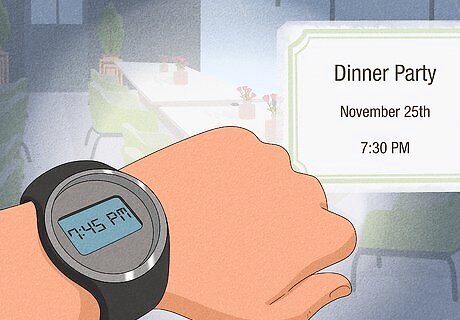
views
- Wine or high-end nonalcoholic beverages like coffee or tea are great go-to gifts that are suitable and even expected at most any dinner party.
- Asking your host if they need you to bring anything to fill in any gaps is a thoughtful gesture that ensures you bring something that will be appreciated.
- Avoid scented items like flowers or scented candles (which aren’t to everyone’s tastes), and don’t bring your own dish, which takes attention off the host’s cooking.
- Arrive 15 minutes late, indulge your host’s requests, and offer to help clean up in order to secure the invite to the next dinner party.
What to Bring

A bottle of higher-end wine. It’s classic, sure, but also foolproof. If you know the host’s tastes, go with a mid- to top-shelf wine you know they’ll enjoy. If you’re unsure about how to choose a gift wine, bring a sparkling wine. These are versatile and easily enjoyed by most anyone, regardless of their preferences. Place the wine in a gift bag to suggest that your host has the option to serve it at the party or save it for later. They may already have a drink lineup for dinner.

An artisanal nonalcoholic beverage like tea or coffee. These are perfect for when you’re not sure if your host drinks alcohol or would enjoy a liquor. They’re lowkey, but still thoughtful in that they’re something your host will enjoy after the party is over. Go for a local coffee blend, or an uncaffeinated artisanal tea to play it safe. Also consider other special beverages like cocktail mixers or fancy hot cocoas.

A top-shelf olive oil. It goes without saying that your host likes to cook (otherwise they wouldn’t be throwing a dinner party). A high-end olive oil is the perfect gift for their culinary craft. It’s a great way to acknowledge your host’s cooking skills, and it’s a great treat for them to try in future meals. You don’t have to break the bank—an oil with a fancy or uncommon label will do the trick, and save you some cash.

Homemade baked goods or chocolates. While you should avoid bringing a whole dish, something small that the host can put out (or save for later) makes for a great personal, unobtrusive offering. Think along the lines of a specialty bread loaf, mini muffins, small cookies, or handmade chocolates. To punch it up, include the serving plate in the gift.

An elegant spice rack, complete with spices. Every cook needs spices, but spices can be a hassle to buy for yourself. On top of that, they don’t always look pretty, and we’re prone to hiding them away in a cupboard. Solve 2 problems at once by gifting your hostess a chic bamboo countertop spice kit. Specialty salts like grilling salts or infused salts also make fabulous gifts for any home cook.

Artisanal honeys or jams. Looking for something sweet, but not as intense as a box of chocolates or a fancy dessert? A specialty honey basically screams sophistication, and an uncommon, artisanal jam makes the most pleasant curveball of a gift. For bonus points, pair them with a delightful honey spoon or an elegant jam spreader.

A serving bowl or other ceramicware. There’s more to gifts than the edible options, and anyone can appreciate a fine serving bowl, vase, pitcher, or utensil rest. They’re things we don’t often think to purchase ourselves, and so are welcome as gifts. It helps that they’re on-theme, too!

A coffee table book relevant to your host’s interests. Is your host batty about architecture? Fanatical about fantasy films? Nutty about…nuts? If you can think it, there’s a coffee table book about it. And who doesn’t love flipping through a hefty tome filled with photographs? It’s like a picture book for adults.

Unscented or beeswax candles. Candles can be an iffy gift, since many scents just don’t jive with particular people. But an unscented candle is the perfect, innocuous-but-still-significant token of your appreciation. Also consider votive candles or candle holders. Go ahead and get that scented candle if you know the host enjoys that scent. Just don’t expect it to be burned at the party, out of respect for the other guests.

Ask your host for special requests. Your host may not have all the bases covered just yet, and the greatest gift is the one the host has asked for specifically. The best part about this gift option is that you’re also giving the gesture as well as the object—you’re saying, “Anything you need, I got you covered.”
What Not to Bring

A dish to eat. Unless explicitly specified on the invite, never bring your own cooking. This is a time to showcase your host’s own kitchen prowess, and your role as a guest is to enjoy and praise the meal that’s set before you, not divert praise from your host. Enjoy that casserole later at home, or start plotting your own party to show off your signature dishes. Small treats or desserts could be fair game, but be sure to ask the host first.

Flowers or plants. Florals are tricky gifting territory, since you never know what sort of allergies might rear their heads at a gathering. And it’s not just allergies—negative, unexpected cultural symbolisms and meanings can evade even the savviest florists, and you never know how your host might respond.

Art or significant decor. You may not mean it that way, but showing up with a piece of art or a centerpiece might suggest that you don’t love your host’s decor. And you do! Show your appreciation by avoiding items of more permanent decor. That said, small, seasonal items like ornaments (if your host celebrities with a tree) or synthetic wreaths make charming, festive gifts.

Anything overly expensive. “Expensive” is relative, but consider your host's means, and aim for a gift that’s thoughtful but not extravagant. A host that receives an overly pricey gift (jewelry, electronics, upscale event tickets, etc.) might feel awkward or indebted, which risks spoiling the mood of the night.

An unexpected plus one, or your kids. Your hostess needs to know exactly how many people are coming beforehand in order to prepare enough food for everyone. In addition, they’re also curating a particular social environment. An unannounced guest might throw off the vibe or even cramp the table. Hire a babysitter, and break it to your friend that they’ll need to make other plans. Plus-ones are totally okay if the invite specifies. Otherwise, keep your additional guests to your significant other or inseparable friend, and ask the host for permission to bring them beforehand.

Your phone. Okay, you can bring it to the party—you need to keep in touch with the babysitter or check the bus schedule, that’s understandable. But don’t bring it to the table; keep your focus on your friends. You’re there for good company and good conversation…in person. Not on social media. If you must, leave it in your pocket on vibrate, and dismiss yourself to the bathroom to check if it’s an emergency text.
Dinner Party Etiquette

Arrive 15 minutes late. True, the invite said 7:30 p.m., but chances are that your host hasn’t quite finished up that roast, or they’re still putting the finishing touches on the table decor. Plus, you don’t want to be the first guest there, left to mill about awkwardly in the kitchen or dining room while your host bustles around. Look at the time listed on the invite, cross it out, and add 15 minutes. Definitely avoid arriving early, but don’t push it and arrive way too late, either. Thirty minutes after the arrival time indicated on the invite is about the maximum delay.

Humor the host. Maybe the host wants you all to pretend you’re on a Viennese canal. Maybe the hostess wants you to try the next course blindfolded, or holding your nose (something about senses and flavor? Sure, whatever). Go along with it. The party is 4 or 5 hours max, and you’ll be out of there soon, in any case. And best case? You might just have fun.

Keep your dietary needs discreet, or notify the host beforehand. You don’t have to eat anything that’ll trigger your lethal allergies, but avoid making a fuss or a dramatic public announcement that you can’t or won’t eat anything. When the dish is passed your way, politely pass it to the next person, and explain to your host later that it’s not because you didn’t want to eat it, just that you couldn’t. If the invite includes a prohibitive menu, either politely decline the invite, or explain your needs to the host, but don’t expect them to go out of their way to accommodate a single guest.

Be mindful of your relationship to the host. If you’re a relative stranger, act polite but enthusiastic and curious about your host’s life. If you’re a close friend or family member, avoid excluding other guests with inside jokes or obscure references. And no matter your relationship: always bring a gift. Your gift can be more personalized if you and the host have a close relationship—books you’d think they’d enjoy, something they mentioned they’d always wanted at previous gatherings, etc. When planning a gift for a less familiar host, keep your gift general-purpose and unobtrusive—wines, specialty ingredients, small confections, and so on.

Offer to help clean up. Your host has already gone to great lengths to put the party on, and volunteering your help is a huge and appreciated courtesy. You don’t need to get your hands dirty in the dish pit, but once dinner is done and the guests move to the next room, linger behind to help gather plates and silverware. Alternatively, if you want to have a dinner party, start with a total budget that you want to have for everything. List the vendors you need to hire, like venue, caterer, florist, and musicians. Then make a budget for each category. When you talk to those vendors, see if they align with your budget for that category. If they are charging more than that, you can choose whether to continue with them or move on to a different vendor.




















Comments
0 comment